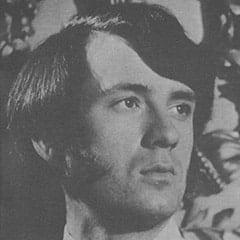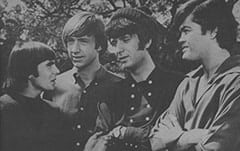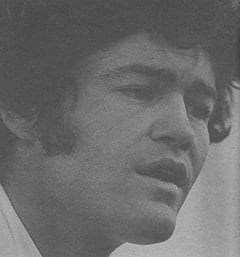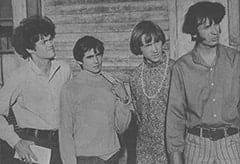Both were handicapped when they were very young, and both fought determinedly against their frustrations and fears—to win at last the tantalizing prize of fame and fortune!
“Battle” is a familiar word in the vocabulary of Robert Michael Nesmith. It seems that it has been with him from birth until that red-letter day when he was signed by Screen Gems as part of the Monkees.
The outcast Permalink
Going back to his early days, Mike remembers that his family was always poor and that “…whole meals, with the trimmings, were like Christmas—very rare.” Another thing that was rare for Mike, as a growing boy, was friendship—mostly because he found it difficult to keep up socially with the other kids in his grammar school “…because they all came from well-to-do families.” He felt that he was looked down upon because of his family’s modest means. He seldom, if ever, got new clothes. When he did, they were from the “work store” and they sometimes had to last him for years. Mike’s secret fight to be accepted by the youngsters who lived near him and who attended his school was a losing battle. When he was 16 years old, he decided to give up trying to be friends with the “in” crowd. He decided that he was just not “with it.”
School work was a struggle for Mike too, and he did not do very well. He was more interested in things like “…where chalk comes from and how much the janitor earns.” He retreated by cutting classes a lot, which did not improve his grades. His lack of good grades really started to show in high school—which Mike considered a drag. By this time, he also considered his fellow students a drag. Thus, from the beginning, Mike felt the pangs of a personal and serious social struggle.
It is easy to see that in his early years Mike found that most of his troubles sprang from his “different-ness” and his offbeat personality. Little did he know then that it would be this very difference which would contribute to his artistic and financial success as a Monkee. Had he known, perhaps it would have been easier for him to accept it all. On the other hand, he developed “soul” from his suffering. He learned to roll with the punches pretty well, and was none the worst for his “modest-income” family life.
Mike & girls Permalink

In defense against his schoolmates’ hostility, Mike became the self-appointed leader of rebellion. His pranks and practical jokes made him a sort of idol to a small group in his class. As a result, however, the girls considered him just a “buddy” and did not take him seriously. They would go to Mike with their problems and he would listen long and advise well. But when Mike would call one of them for a date, they’d put him off. This really got Mike down, and by the end of high school he’d had the “pal” bit with girls.
Mike went on to college for “…the lack of anything better to do.” It was there that he decided the time had come for him to grow up. In college he met Phyllis, who was going steady with another guy at the time. So Mike didn’t date her—but he did ask her to marry him! She said “no.” Another put down. But Mike, who has a quietly determined nature, “chased” Phyllis for two weeks. Then he popped the question again. This time she said “yes.”
Music Permalink

Mike’s musical career started when he got his first guitar at the age of 19. He couldn’t play it and he couldn’t afford lessons, so he taught himself to play his guitar. He didn’t know any songs, so he wrote one. He found it so easy and engrossing that he wrote another. Soon, he was spending most of his time playing his guitar and writing songs.
After college, Mike went to Hollywood to check out the scene and joined a rock and roll group of three. Just as things were starting to swing a little, one of the group got drafted, another went back home, and Mike went into the Air Force. His career had to wait awhile.
He did not find the Air Force at all to his liking, but this went back to his days of not getting along with the so-called “in” people. By this time, Mike’s strong individuality had fully developed—which did not set too well with his superior officers. After Mike’s stint in the Air Force, the Nesmiths moved to Hollywood—and Mike’s struggle for a career was linked with a day-to-day existence of worrying about rent and food money. He worked off-and-on at places like the Troubador in Los Angeles, but neved on a continuing basis. And soon there were three mouths to feed. Christian was born in January, 1964.
No one, except perhaps Phyllis, will ever really know what Mike’s lack of money meant to him. By now, he was very used to this type of existence—but not being able to give Christian all the things that he felt his son was entitled to hurt Mike deeply.
Then a Monkee Permalink
One day Mike saw the now famous “Monkee” advertisement in Variety—along with thousands of other young actors in Hollywood and New York—and he answered it also along with the other thousands. He was surprised and happy when he was called for a second interview, and then for another! The thousands of applicants had been broken down to a little under 500, but Mike kept being called back. He ended up going back six times.
On the very day that Mike’s car (and in Hollywood you’re lost without one) was repossessed, due to lack of money to make the monthly payments, Mike was notified that he had been chosen to be one of the four Monkees! Little did he know, on that fateful day, that it was a turning point in his life. No more worrying over the rent and food money. No more doing without the things he wanted to provide so that his wife and son would be well taken care of. Finally, Mike’s big fight was over!
Micky’s first sorrow Permalink

When Micky Dolenz was five years old, and about to enter kindergarten, his parents noticed that he was starting to walk with a bad limp. This began the usual trip to the doctor to find out what was wrong. One trip multiplied into several appointments during a two-week period and, after many X-rays, it was discovered that Micky had a serious bone disease. He was told that he would have to use crutches for at least three years, so that his delicate hip bone could grow normally. It was difficult for Micky to understand, and it seemed to him that his whole world was suddenly falling apart. Micky longed to join his school’s sports program. He wanted to play baseball and basketball in the years to come, but he couldn’t. He suffered in agonizing silence. But his ordeal made him appreciate his legs more than a normal person did, once he was able to throw away his crutches.
Even now Micky has a special place in his heart for kids who haven’t got it so good health-wise. This is one of the reasons he spends a lot of free time visiting children’s hospitals. Often, on a Friday afternoon, he will arrive at the Raybert offices and load himself down with all sorts of Monkee goodies—like records, pictures, bubble gum—and cart them off with him for an afternoon’s visit to a children’s hospital. Micky still has a slight limp, but you have to look closely to notice it. He walks, runs and does his own stunts on the show—but when he stands for too long a time, his leg becomes slightly painful. However, it doesn’t interfere with his ability to make people love a lovable clown!
The “burning” star Permalink

When someone has a burning desire for stardom at a very early age, as was true of Monkee Micky Dolenz, and later finds himself working as an automobile mechanic—it is not an easy pill to swallow. But George Michael Dolenz, Jr., was equal to the struggle and never stopped working hard toward his one goal—to be a show-business success.
Micky’s interest in acting started when he was eight years old, and came to him naturally as his father George Dolenz was a well-known actor. It was his father’s agent who ultimately suggested that Micky try out for the (then) new television series called Circus Boy. To everyone’s surprise (and to Micky’s delight), he won the conveted role! Little did he know then that heartache would follow this first taste of theatrical success, for his newly found fame was pulled from under him a short time later. During this time too another and more serious blow was dealt to Micky—his beloved father died. Two heartbreaks were almost too much for young Micky to bear. With Circus Boy canceled, Micky also had to put aside his plans to go to college, because he felt that he should contribute to the support of his family.
Micky had started in music sort of by accident. While he was working in Circus Boy, the producers wanted him to do a personal tour and, since he did not sing too well, they decided to teach him to play the guitar to accompany himself and hopefully improve his sound. To everyone’s surprise Micky learned to play the guitar in a day and a half! At 17, Micky thought that he was going to get another chance in show business when he met someone who promised to record him, but his “benefactor” turned out to be just another one of those “I’ll make you a star” type people—and it fell through.
Then The Monkees! Permalink
Like the other three Monkees-to-be, Micky’s life changed the day he read the ad in Variety, but even more thrilling was the fact that he did not know he had been chosen until he read another story weeks later in the same trade paper announcing the names of the four boys who had won the starring roles! Micky couldn’t believe it! He called the newspaper office to ask if it were true and not just a joke!
At the time this happened, Micky was working as an automobile mechanic. As was noted earlier, he did not go to college because of the death of his father. However, he was able to attend the Los Angeles Trade Technical College, where he took some general courses and also studied psychology and science—still working during the day to help his family.
Perhaps one of the reasons Monkee Micky spends so much of his free time reading now is that during his earlier years he felt that he could not get the full advantages of the kind of education he wanted. Micky also does a lot of painting, and works on collages and montages. People close to him agree that Micky, like the other Monkees, is very serious about his work. He admits that his first year as a Monkee was a silent struggle for him. Unlike the other Monkees, Micky had been in one TV series which was canceled, and he was scared that it would happen again! But as we all know—history did not repeat itself!!
Davy and Peter will talk to you about their early “difficult years” in the November issue of 16. Both D & P will reveal some of their deepest, darkest secrets things they’ve never told before! Itza don’t miss! Your November issue of 16 will be waiting for you at your neighborhood newsstand on September 24. Be sure to pick it up!!


